Legends of the Super League
As one chapter ends and another begins, we talk to four legends who remember the very start of the Netball Super League back in 2005 and have fascinating insights into the 19 years of the League and what the future holds.
The Netball Super League started in 2005-06, taking the place of the Netball Super Cup, which was a short, sharp six-week tournament with six sides (Birmingham Blaze, London Hurricanes, London Tornadoes, Northern Thunder, Northern Flames, and Team Bath Force) that ran from 2001 to 2005. Senior England players and development squads were evenly distributed, and each side was initially allowed up to three overseas players. London Tornadoes were the competition’s most successful team, winning three of the five titles, with Northern Thunder and Team Bath Force winning one each.
Then in 2005-06 came the first iteration of the Super League. Here is a potted history of this storied competition.
Here is a pictorial history of the early years of the Super League, in which you will find three of the legends that we interview in this magazine.
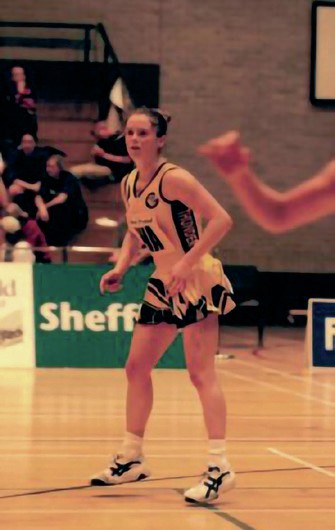
2001 - Karen Atkinson of Northern Thunder
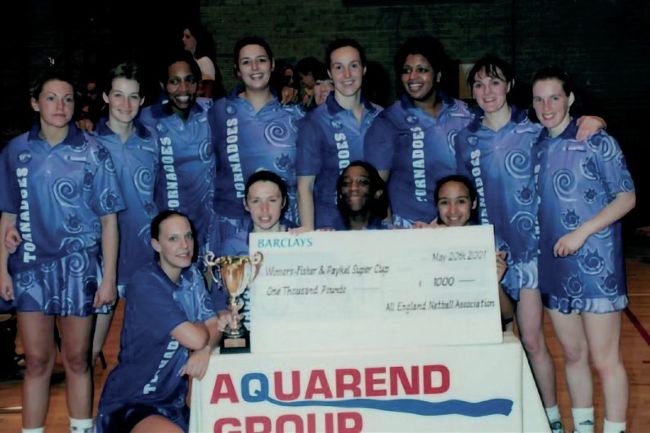
Super Cup winners 2001 - London Tornadoes
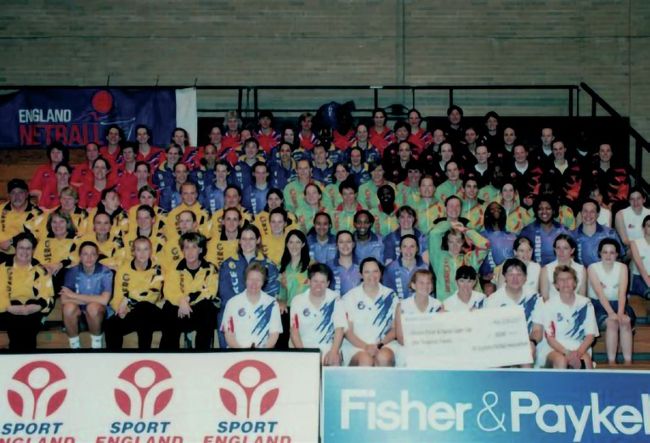
The 2001 Super League teams line up
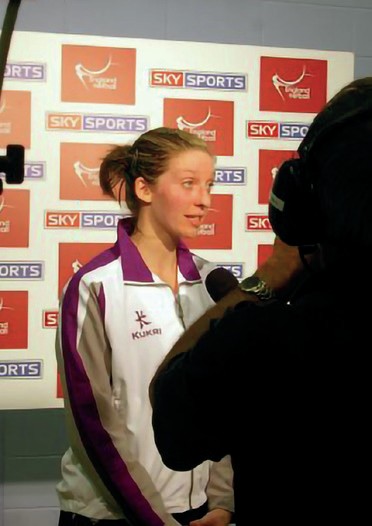
Olivia Newton is interviewed
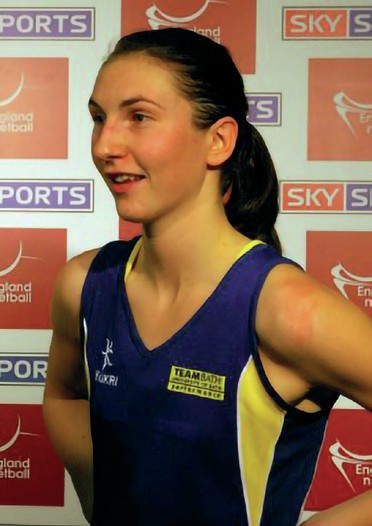
Rachel Dunn talks to the media
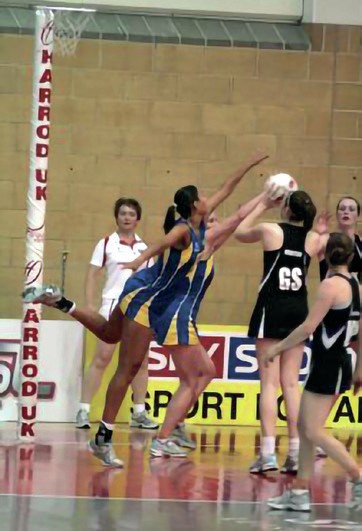
Jo Harten and Geva Mentor in the 2007 final
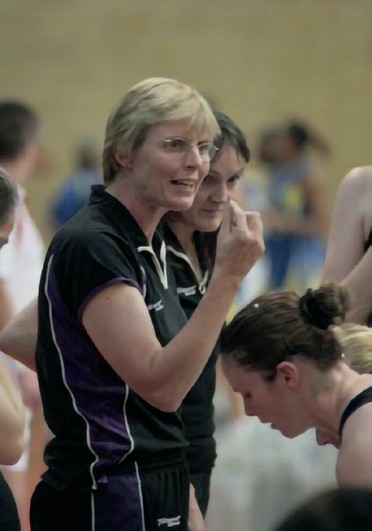
Maggie Jackson during the 2007 final
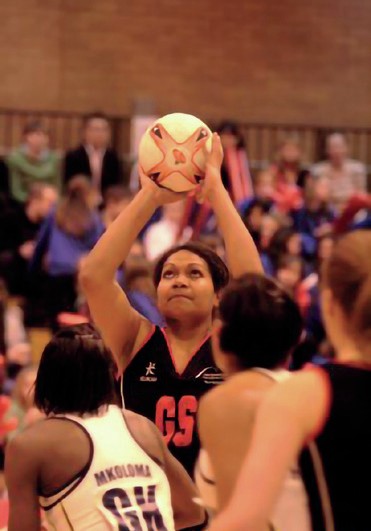
2007 - Sonia Mkoloma defending
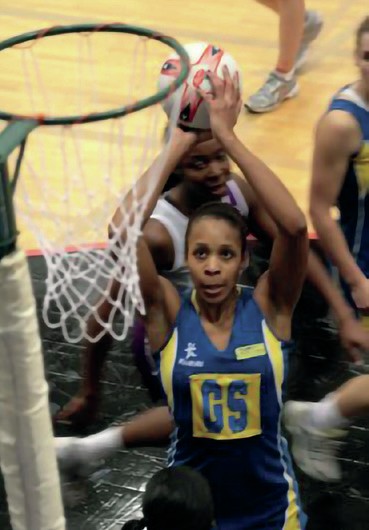
2007 - Pamela Cookey goes for goal
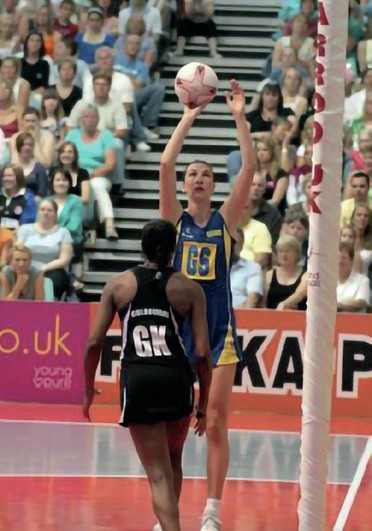
Rachel Dunn shoots in the 2007 final
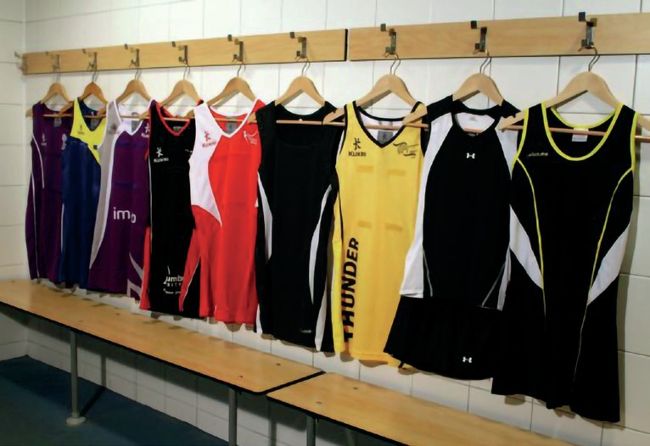
The 2007 team dresses
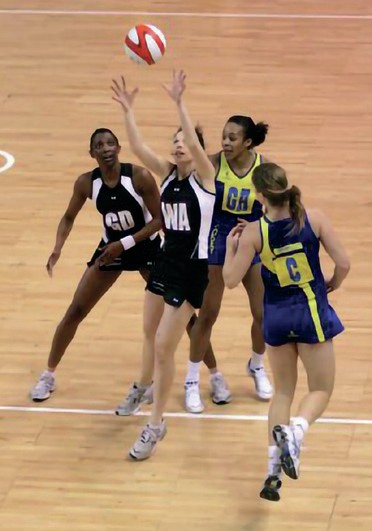
2008 - Amanda Newton, Pamela Cookey and Anne Marie Muller
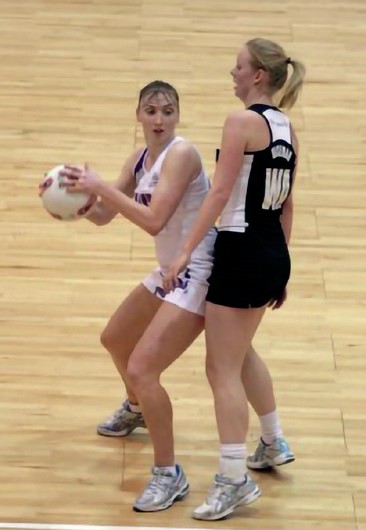
2008 - Jade Clarke of Loughborough
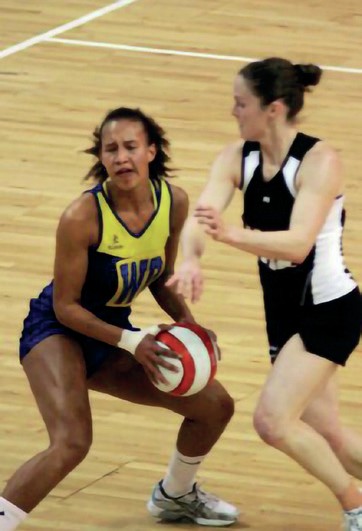
Serena Guthrie and Karen Atkinson
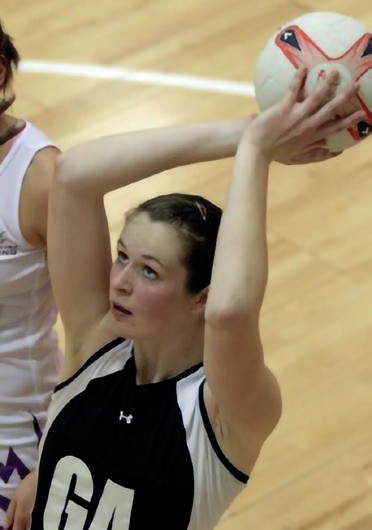
Mavericks’ Louisa Brownfield in 2008
And now, it’s over to the four legends of the Super League
MAGGIE JACKSON MBE
Maggie was co-founder of Hertfordshire Mavericks, former Head Coach of Mavericks and led the Club to six Grand Finals, including their two titles, in 2008 and 2011. She won NSL Coach of the Year in 2008 and is an exceptional coach educator, mentor and lecturer in netball coaching. Maggie is also a former England player and participated in the 1985 World Games and the 1987 Netball World Tournament in Glasgow. She was England’s Assistant Head Coach at the 2006 and 2010 Commonwealth Games, as well as at the 2011 Netball World Cup in Singapore, winning bronze at all three tournaments. Maggie is an England Netball Honorary Life Member and has also been inducted into the England Netball Hall of Fame.
Take us back to the beginning of the Super League...
We’d had Super Cup for three years, so I’d got myself involved in Birmingham Blaze in those days and that was the start of that feeling of coaching slightly differently. But obviously before, while that was happening there were the counties. That’s all we knew.
The Super Cup was a short and sharp tournament, yes?
That’s right, with England players allocated to make it equitable.
How did Super League come about?
I think as now, we were asking what does England Netball need to be number one in the world? I’ve been involved in so many bronze medal
matches that I don’t want to even think about it now! We’d always been third, sometimes fourth. So how could we make that next step? And Super League was part of that. We had eight teams distributed around the country and I think Bath, who had been running a great programme for two or three years under Lyn Gunson, were the catalyst.
Lyn would do these road trips round the country in a minibus and take youngsters – Jo Binns, Pamela Cookey, Tamsin Greenway – around to play. They often got beaten, and often didn’t get back to Bath until three in the morning, but they were learning on the job. And because of that they were the team to beat early on.
What about the early years with Hertfordshire Mavericks?
Well, I am known for reaching six finals on the trot and only winning two! We lost to Bath twice and then we beat Loughborough and then lost twice again to Bath and then beat Surrey. But really, I think we were just so happy to be part of something progressive. Gloria Keech and I cofounded Mavericks and she provided so much support, without which none of it would have been possible.
What were the challenges?
Well, nobody got paid, players or coaches. And I don’t remember much sponsorship. We got value in kind but not much more. The counties put money in, and we had some income from tickets but money was a big, big challenge. And of course the size of the stadiums was limiting, and always has been. Then there was travel to matches – we stayed overnight up in Scotland and in various places but often we would come back on a bus. We tried really hard from the get-go to define performance and say, OK, what do we need to do? So suddenly the players were training twice a week in the evenings, which is ridiculous now when I think about it. We were starting to deliver a performance programme, finding strength and conditioning coaches, physios, all the things that we hadn’t really done at county. And we had to look at medical insurance and all that kind of stuff as well, trying to support the players a little bit more. But it was still very, very basic.
Over the years, what are the key things that have changed?
I think the crowds stayed roughly the same for a long time, although now you’ve got some bigger venues, which is great, and obviously that’s the key thing going forward. We had Televideo working with us in the early days but social media has obviously become massive, as are the deals with Sky and now the BBC. The whole sport is so much more available these days. w
And it took many years for the training to change, but it has done now. You have got athletes training during the day, which never ever happened. Back when it started, we were trying to manage work along with everything else.
And finally, what of the future?
I think it’s really exciting. And I’m still young enough to understand it! It feels like what we did back in 2005. And that’s fantastic because you need people to step into the unknown and players and coaches to take a massive risk with their careers. I admire the franchises that have put their hat in the ring because it’s hard to make a profit in sport. Filling the venues is going to be massive, that’s my biggest concern, finding a whole bunch of new spectators to fill the venues. But I do take heart from the explosion of interest in women’s sport and, frankly, it’s the only way forward. Clearly we have to continue to be successful on the world stage as well, but there’s no reason why that won’t happen. I just hope people are patient.
MAGGIE’S SUPER LEAGUE SQUAD
“I’ve picked a squad from my time coaching in the Super League.”
Defensive unit – Geva Mentor, Amanda Newton & Ursula Bowers (vice captain) Midcourt – Serena Guthrie, Karen Atkinson (captain), Jade Clarke & Olivia Murphy Shooters – Jo Harten, Pamela Cookey & Louisa Brownfield
FAVOURITE SUPER LEAGUE MEMORY
I guess winning two finals and being in six consecutive finals has to count for something! But being a part of the group of players that I had was very special – they were true leaders. There was a point in one match, and dare I say, it was a semi-final against Loughborough, where we were seven down with two minutes to go and we levelled it. And then we won in extra time to get to the final. I don’t think I’ve ever known anything like that in my life before. Goose bumps.
JACKIE MIZON
Jackie has been an umpiring stalwart of the Netball Super League since 2012 and umpired well over 150 matches. She umpired five Grand Finals in the space of seven years and is now Officiating Assessor for the Netball Super League.
Jackie umpired 81 internationals, including at the 2015 and 2019 World Cups and the 2018 Commonwealth Games in the Gold Coast. She has now been awarded her World Netball International Umpire Award Testing Panel Cadet status.
What are your pre-Super League memories?
I was cutting my teeth on the Super Cup. I was a B Award umpire back then, trying to get a little bit of experience wherever I could, trying to find my way. Pathways for officials were almost non-existent back then!
And then Super League came along. I remember it coming on the scene and just thinking, wow, what is this new competition?
So what was it like?
Pretty basic. We’d probably laugh now if we saw a game from back then. No pizzazz, no music, not that many people watching.
Were you watching the officials?
Yes! I watched the officials during those Super League games! And I actually work with them now as they are assessors! They were my role models. And I can remember watching games, following the officials and never being able to work out how they moved like that. Because it looked so effortless. Of course, they’re all the skills an umpire learns – it’s all about vision.
And I grew up in the East region. Maggie Jackson was the Mavericks coach, Karen Atkinson our star player – she was England captain at the time and my absolute idol of a player. I just thought she was marvellous. And then Sheelagh Redpath, another legend of England Netball, met me – and remember I was a mum with four children, but I still felt like a schoolgirl at that point – and she got rid of my old-fashioned whistle, gave me a finger whistle and got me involved in the warm-ups. With Maggie as coach and Karen in there too!
And then I had to fill in and take part in training as they were short! You wouldn’t get that now!
Things have obviously changed a lot!
They have, but what hasn’t changed is the role of the umpire to let the players be as good as they can be within those rules, even when those rules change.
FAVOURITE SUPER LEAGUE MEMORY
Semi-finals are what I remember. They are the big moments, but sometimes you get the best games from the most innocuous places. I remember umpiring the Dragons against the Sirens. It was basically like a little international within the Super League environment. Those games were fabulous. The local derbies are great. There’s just a different feel to them. And I think that’s great because that’s the history of the sport. Those people have come up through their pathways in their regions and you just get those different battles. And I also remember umpiring Geva Mentor as a 16-year-old. It was my first big event as a B Award umpire. And I had never seen anything like it. She was majestic and her team won the tournament. I had never umpired a player like her.
I think now the players and coaches understand they have got to work alongside us, and that we can learn from one another. That has been probably the biggest progression that I’ve seen. That interaction has been quite powerful and I think sits behind a lot of the success of our national team because we do a lot with our national team behind the scenes, with Gary Burgess leading.
We’ve got young umpires coming through now that are so talented, it’s wonderful to see. And they’re coming through on our pathways.
Is it more difficult to umpire these days?
It is because the players are fitter, stronger and more professional these days. I retired as an umpire in 2019 and what I see now is just unrecognisable from when I started in 2012. The growth is immense, even just from 2019 to the current day. They are amazing athletes, truly amazing athletes. And I think that’s important because for us to grow and continue to grow and succeed, we’ve got to be good to watch. We’ve got to be exciting. And our job as umpires and assessors is to try to get the players to achieve that whilst maintaining player safety and playing within the rules. And that’s not easy.
JACKIE’S ALL-TIME SUPER LEAGUE TEAM
GK -Geva Mentor
GD - Amanda Newton
WD - Serena Guthrie
C - Olivia Murphy
WA - Karen Atkinson
GA - Pamela Cookey
GS - Rachel Dunn
SERENA KERSTEN MBE
Serena Kersten (née Guthrie) played for Team Bath from 2007-15, then went to play overseas in New Zealand and Australia for four seasons before returning to Team Bath from 2019-22.
Serena played for England from 2008-22, including at multiple Commonwealth Games, Netball World Cups and broader World Series events. She was coached by Maggie and played alongside Pamela. She was part of the England squad that won gold at the Commonwealth Games in 2018.
What are your memories of a pre-Super League era?
What I remember is that I was really young, at Bath and surrounded by this amazing group of women with captain Ursula “Billy” Bowers, Pam Cookey, Tamsin Greenway, Jo Binns, Sara Bayman, Asha Francis. And I just remember Team Bath being so incredibly dominant. It was crazy how good they were. And as a youngster stepping into that space, I was like, wow, these girls can really play. So I always say that I was really lucky in terms of my first experience of being around female athletes who were striving to be world-class. And then other teams were pretty competitive – Brunel, Loughborough, Mavs.
Bath was the place to be if you wanted to be around the best players. I didn’t really have a clue to be honest, I kind of just asked to come and be a part of the high-performance programme as a 16-year-old, and stepped into an amazing environment. The fact I got to train with that group in such an open environment was incredible.
You started playing in 2007?
Yeah, but I was on the pathway, I was a part of the team as more like a sub or training partner. That season I sat on the bench a couple of times and I remember being like, wow, I get to be on the bench. And that is why I always say to young players who just want to get on the court, that bench time is such a special time and not to underestimate what it means or what you can learn. I remember just trying to warm the team up to make sure that they could go out and be the best that they could.
Seeing senior players, how they behaved, how they interacted with each other, that built the foundation of who I wanted to be as an athlete. And if I had been on the court too soon, I wouldn’t have got the opportunity to think about that.
“Billy” was amazing as a leader. There was a seriousness to her when it came to game time, but also an amazing fun side too. And I think that’s probably where I learned how to balance pressure and high performance. She was the first example I saw. I can’t speak highly enough of how she led that amazing group of characters because there were a lot of egos in there, a lot of talent.
Did it feel like a high-performance environment?
It did. And we really trained hard, every day, twice a day, sometimes three times a day. We were so committed. Lyn [Gunson] had instilled in us that we had a broader job around female sport and that everything we did, we needed to do better. We needed to think twice about who we hung out with, where we went, what we said, because people would be looking at us even harder because we were female. So that was the introduction for me of this baton that you carry as a female athlete in terms of trying to pave the way.
What are your memories of Super League as you played more regularly?
I think the franchises were probably trying to find their feet a bit as I was, I suppose. I remember us being competitive with Mavericks, Loughborough, Brunel, so it was three or four dominant teams. There were some brilliant players in the other teams, but the strength in depth wasn’t quite there. I think the majority of England players were probably from the four top clubs whereas now you’ve got a real spread.
SERENA’S ALL-TIME SUPER LEAGUE TEAM
GK – Geva Mentor
GD – Amanda Newton
WD – Serena Guthrie
C – Jade Clarke
WA – Karen Atkinson
GA – Pamela Cookey
GS – Rachel Dunn
What was your thinking about leaving Super League to go play in the ANZ?
It was clear at the time that if I wanted to take my game to the next level, I needed to be out and about in the world and amongst some of the best netballers. And my best mate Jo Harten was out in Australia playing and she was telling me how cool it was. So my decision to go over to Northern Mystics was quite an easy one. I needed to play against different styles of play to develop.
Manchester Thunder had actually started to play in a different way – so strong and dogged – but both at Super League and England level, we struggled against teams with real physical presence.
And looking back it was a great leadership experience. I was just so green in so many areas around people management and my own self-awareness. I think the first thing that I noticed was just the level of professionalism, the level of detail, and the crowds!
The noise and the following were amazing. I couldn’t go out for a beer on a Friday without being reminded I had a game that Sunday!
Then you came back to the Super League…
Yep, I just love English netball! And I could never quite shake the feeling of being an outsider over in New Zealand and Australia, however great they were with me. And I’ve always been a strong believer that we had and have the potential to be a real powerhouse in terms of style if we get it right because we can be a hybrid League where you’ve got a range of styles. There’s more flex, more flair, a bit more potential to be more creative with the style of play that we have in British netball. So I wanted to try and be a part of that.
What did you find when you got back?
Well, I just wanted to make a difference. To help the young guns, the likes of Sophie Drakeford-Lewis, Layla Guscoth, Imogen Allison. So I was quite excited to be in and around some youth, with me being a more experienced player. The League had changed a lot, there had been a shift with more players striving to be England players.
FAVOURITE SUPER LEAGUE MEMORY
I remember a final in Coventry in 2009, against Mavericks with Karen Atkinson, who was England centre. I admired her so much and I was starting to play a bit of centre and I got an opportunity to have a crack in the final. I remember feeling like this was my first real opportunity. I’d been sitting watching Jo Binns for years starting in the middle and all of a sudden it was my turn. And we played brilliantly.
I remember that day thinking I might have got one over on Karen because she was always such a tough opponent and it didn’t happen very often. It was one of my first tests as a young player coming up against a senior player. She’s a brilliant role model and I wanted her respect.
So the Vitality Roses programme had become a real driving force for Super League players?
Definitely. I think in those four years between 2014 and 2018, the programme had started to shift dramatically and become less regimented, more owned by the players. It seemed to be a little bit more give and take with some of the conversations that we were having around performance and training.
And people started moving clubs to get more court time. People were prepared to move more to give themselves a better chance to get into a Roses programme.
It was so much stronger, with so much more depth and different types of talent, which was really exciting to play against. And when you’re coming up against one style of netball one week and another the next, it challenges your skill set more. Whereas in Australia, you know what you’re getting every week – a hard and fast game. There are certain things in that league that you just need to do really well all of the time. And a lot of that’s around basics. The basics of your movement, the basics of your placement on court, the lines that you’re running, things like that. Whereas the Super League was a different challenge, a more complex one.
What about the future, with all the changes for 2025?
I think we’ve all recognised that it can’t stay as it is. We had this growth period and now is the right time from a commercial point of view to take the game to a different space. And I think the model will drive a lot of attention – in the first year there are going to be a lot of eyes on the League. And the pressure on players is going to increase, they’re going to be required to make sure that this product is as competitive as it can be.
But we’re not starting from ground zero, we are starting from an exciting space and there is a solid foundation that’s been built for the game over the last 20 years.
PAMELA COOKEY
Pamela played with Team Bath in the Netball Super League at the competition’s inception in 2005, winning two titles in 2005-06 and 2008-09, before heading to New Zealand to play for Northern Mystics. She then joined Surrey Storm in 2015.
Pamela was named in the 2002 Commonwealth Games squad but made her senior debut in 2004, going on to win bronze at the 2006 and the 2010 Commonwealth Games, the latter coached by Maggie. She won silver at the 2010 World Series.
What do you remember about a time before the Super League?
What do you remember about a time before the Super League?
Well, there was the Super Cup and that was pretty cool. I started playing for Team Bath when I was 16 and Mum used to drive me down once a month to train with the girls before I then moved down for my A-Levels. So pre-Super League we were all training together, but then we'd split off to play for different schools, clubs like Hucclecote or Toucans and County teams.
And then came the Super League?
Yes, exactly. If I remember correctly with the Super Cup we came last in the first year, second-to-last, then fourth, then won it in the last edition. Then Super League came, and we won that in the first year. With Lyn [Gunson] in charge, it was all about developing us as individuals first, with all our quirkiness, our differences and talents embraced. We just created this family.
Did it feel like the start of something big?
Definitely, because you could see the improvements, everyone was just getting better and better and the focus on the league increased, and we started to be taken seriously.
How did it develop?
Lyn then turned us into a really good team. It wasn't just about the skills, it was about winning games and having that winning mentality. And in those crucial or difficult situations, how do you step up to be better than the opposition. We had “Billy” Bowers as captain with a brilliant mindset – she was wild and passionate and on court she had that self-belief in terms of saying we wouldn't be here if we weren't good enough, so show it!
Did it feel like the sport itself was growing, was there more marketing around it?
It did, and Sky played a huge part in that. The fact that they came on board – and I know England Netball subsidised that at the start – was key to getting in the door. And then as the years have gone by, Sky put more and more into it, so now it is a proper showcase.
The more people enjoy seeing it, the more they can take out of it, the more they want to follow it and invest in it. I've definitely seen that shift over the years.
How was your ANZ experience?
I loved it! It was a step up to a more professional environment. I learned week-in, week-out, about playing against the best netballers in the world, training professionally in the daytime, not early mornings or late at night as had been the case back home. Then we’d go over to play in Australia two days before a game! That would be unheard of in England back then. And every game was televised, with the arenas packed.
What aspects had changed when you got back to the UK?
Well for one, when I came back to play for Surrey Storm in 2012, I think that would have been the first time I had been paid to play netball in the UK! But also everything had improved, and continues to do so, in terms of training, skills, nutrition, strength and conditioning, the whole lot.
What do you think of the plans for 2025?
As a player and fan, I think it could be awesome if everything that's been talked about comes to fruition. I'm gutted about the South West not being represented but the fact that there are people who want to invest in it and that the salaries are going up, we are looking to fill arenas and make it a real spectacle on all fronts, makes me really excited.
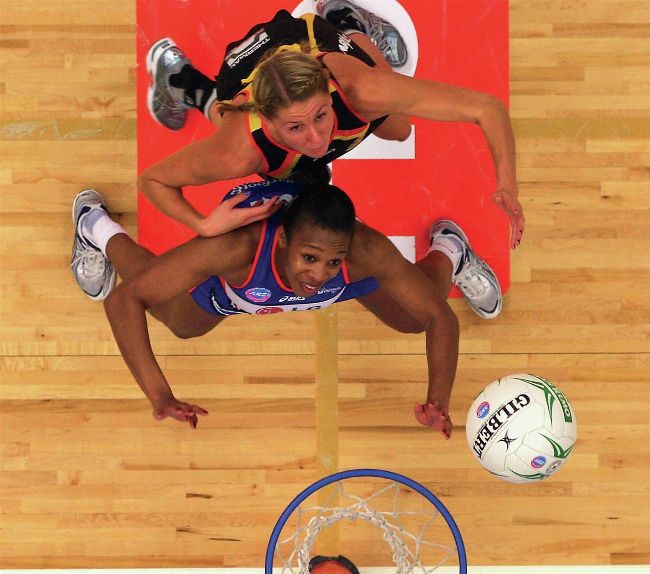
PAMELA’S ALL-TIME TEAM BATH SUPER LEAGUE TEAM
GK – Geva Mentor
GD – Ursula Bowers
WD – Serena Guthrie
C – Sara Bayman
WA – Tamsin Greenway
GA – Pamela Cookey
GS – Rachel Dunn